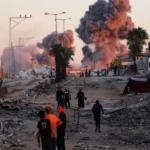
Sahel: “Our indifference to coups would be a collective fault”
The coup in Niger is one more, one too many, for the Sahelian region. The return of the seizure of power by military force reflects the deep, even structural malaise experienced by part of Africa in its leaders and its institutions. The political alternation that would be able to pacify political transitions has not yet become part of political mores. Every leader, however popular and legitimate, seems unable to resist this unfortunate tendency to want to circumvent the constitutional framework in order to prolong his regime. And, on another front, it is observed more and more that of seeing the soldiers come out of their barracks to take power. Developments that necessarily lead to chronic frustration and instability, annihilating the efforts of decades of development.
In the current context, regional and international organizations (African Union, ECOWAS, United Nations, European Union, etc.) appear powerless to bring down the military juntas that seize power by force. International pressures have little effect on the “putchists” who react to pressures, even interventionist threats, coming from outside with an implausible and unimaginable “boldness” a few years ago,
From a geopolitical point of view, this coup clearly demonstrates the worrying swing of a part of Africa and not the least, namely the Sahel and West Africa, towards the questioning of institutional legality and international law by relying, if necessary, on occult forces, such as the Wagner group, and on mobilizing anti-Western discourses of circumstance. Indeed, this region in the heart of Africa is full of significant natural, energy and cultural wealth as well as a well-educated youth. It represents a total area of about 3 million square kilometers. The population of the 6 Sahelian countries (Senegal, Chad, Niger, Mali, Burkina Faso, Mauritania) would increase from approximately 100 million people currently to 330 million in 2050 if current birth rates are maintained (3.9% per year ). Niger, for example, currently holds the world record for fertility with 7.6 children per woman.
The main lesson to be drawn from this is that we are witnessing through these events the failure of “politics” in the strongest sense of the term. First, in terms of economic and social responses to the difficulties of populations in countries that are vast in area and with porous borders exploited by terrorist groups. Secondly, these are countries with wealth highly coveted by foreign powers. These, in turn, have a responsibility in the current situation. That of not providing the means to truly help these countries to emerge from a primary economy, driven by their interests and above all by their electoral strategies and political one-upmanship. These same powers take advantage of the inability of African leaders to negotiate in a sovereign manner favorable terms of trade for the local economy to move upmarket in terms of human development (education, health, housing, infrastructure, etc.) of local value (agro-industry, crafts, construction, infrastructure, etc.).
Foreign powers are most often satisfied with small-scale and uncoordinated cooperation projects, sprinkled here and there in the territories of the countries concerned, thereby justifying their presence with development aid, the benefit of which almost always goes to the country. who originated it. This is noted even in multilateral organizations, given the weight taken by conditional funds and tied funds.
France, historical and traditional partner of the French-speaking Sahel, has devoted itself more than other nations by sending its children to fight against terrorism in the Sahel. A very honorable and very respectable political act (Operations Serval and Barkhane) to which it is up to pay tribute in memory of the many young soldiers who fell on the battlefield in the Sahel. But it is clear that here too the results are all relative in view of the current rejection of French military intervention in this region of the world. A risky posture on the part of the “putschists” because mobile and flexible terrorist groups will take advantage of this to occupy the field.
Also, it seems necessary beyond the sterile controversies and the emotional context that this last coup d’etat in Niger arouses, to rethink “politics” in an Africa increasingly bruised by instability and insecurity, as if we were witnessing the return of the demons that undermined development within the continent in the past. Traditional approaches (development aid, military interventions, international pressure, etc.) have had their day.
A few years from the year 2030, the deadline set by the United Nations for taking stock of the Sustainable Development Goals (SDG-2030), we are still far from the target to anticipate a positive assessment. World Bank data indicates, for example, that on Africa’s current trajectory, the continent will still have 479 million Africans (or 28.1% of its population) living in extreme poverty by 2030. The consequence would then be the aggravation of social crises with its share of poverty and economic and climatic migrations for a youth whose opportunities are dwindling. 46 to 50% of the inhabitants today in this region are under 15 years old (i.e. more than double the world average which is 26%) and nearly 63% of this population is under 24 years old. According to the UNDP, the Human Development Index (HDI) – a composite index which measures the average level achieved in three essential dimensions of human development: health and longevity, access to education and decent standard of living – of the countries of the Sahel are among the lowest in the world. Niger is ranked in last place among the 189 countries counted. This might also be one of the reasons for this coup.
Between 3 and 5 million people have left the Sahel since independence. They will probably be around 40 million by the end of the century. However, the closing of borders to migrants in the relatively more prosperous regions supposed to welcome African migrants (North Africa, Southern Africa, Europe, Americas, Asia, etc.) will only aggravate political and social tensions in these same countries. In such a context, it is obvious that the news in Niger and the Sahel concerns us all and should in no way appear to us as isolated and distant events, it would be a collective fault, especially as Africans.
This article is originally published on fnh.ma





